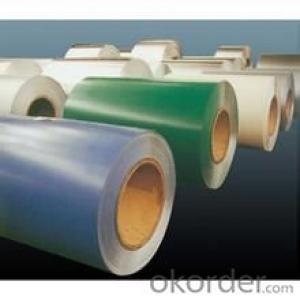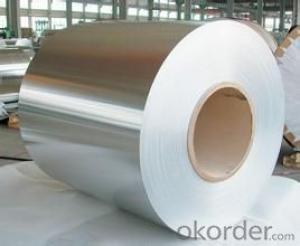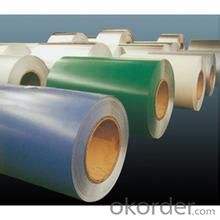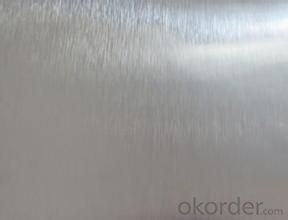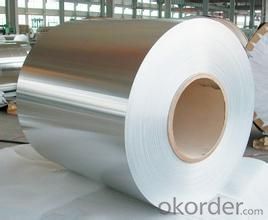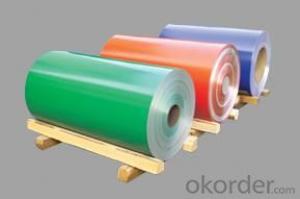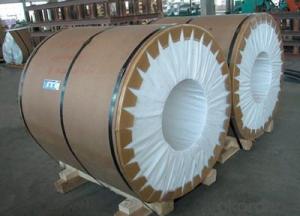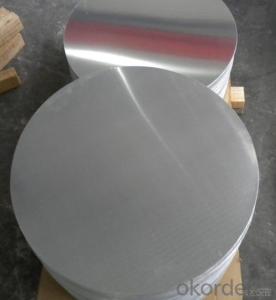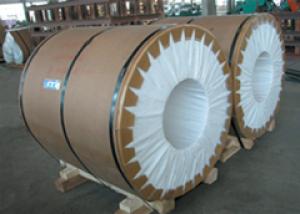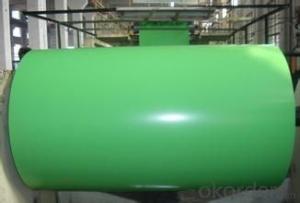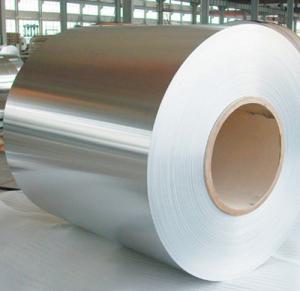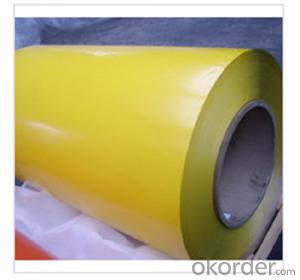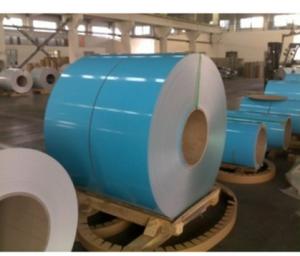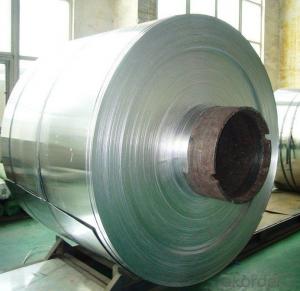Brushed Aluminum Coil - Smooth Surface Alu-Coil
- Loading Port:
- China Main Port
- Payment Terms:
- TT OR LC
- Min Order Qty:
- -
- Supply Capability:
- -
OKorder Service Pledge
OKorder Financial Service
You Might Also Like
Aluminium is a relatively soft, durable, lightweight, ductileand malleablemetalwith appearance ranging from silvery to dull gray, depending on the surfaceroughness. It is nonmagnetic and does not easily ignite. A fresh film ofaluminium serves as a good reflector (approximately 92%) of visible lightand an excellent reflector (as much as 98%) of medium and far infraredradiation. The yield strength of pure aluminium is 7–11 MPa,while aluminium alloys have yield strengths ranging from200 MPa to 600 MPa. Aluminium has about one-third the densityand stiffness of steel. It is easily machined,cast, drawn and extruded.
Aluminium alloys (or aluminum alloys; see spellingdifferences) are alloysin which aluminium(Al) is the predominant metal. The typical alloying elements are copper, magnesium,manganese,silicon,tin and zinc. There are twoprincipal classifications, namely casting alloys and wrought alloys, both of which are furthersubdivided into the categories heat-treatableand non-heat-treatable. About 85% of aluminium is used for wrought products,for example rolled plate, foils and extrusions.Cast aluminium alloys yield cost-effective products due to the low meltingpoint, although they generally have lower tensile strengthsthan wrought alloys. The most important cast aluminium alloy system is Al–Si,where the high levels of silicon (4.0–13%) contribute to give good castingcharacteristics. Aluminium alloys are widely used in engineering structures andcomponents where light weight or corrosion resistance is required
Specification:
Alloy: AA1050, 1060, 1100,AA3003, 3005, 3015, 5052, 5754, 5083,8011, etc
Temper: H14/16/18/22/24/32,HO etc.
Thickness: 0.2mm—100mm
Width: 100mm—2300mm (Can be slitted)
Inner Diameter:508MM
Coil Weight:500kg-3000kg(Max.)
Application:Foil stock, Circles, Roofing, Can stock, Marine plate,Anti-slipery purpose in vehicles, packing and appliance.
Features:
1. Excellent quality of products
2. Quick delivery
3. Best service to clients
4. BV,SGS avalible
5. No buckle o waveness
6. Tension leveling
7. Certificate of Origin
8. Form A,E
Packaging Detail:
Carton ,Woodenpallet with plastic protection packing ,standard seaworthy packing or as yourrequest.
Production Capacity:
AnnualProduction capacity of 600,000 tons.
Products areexported to United States, Canada, U.A.E, Brazil, Mexico,Thailand, Vietnam,Nigeria etc, over 100 countries andregions all over the world.
Production Line:
CNBM aluminumproduction base is comprised of 18 aluminumannealers, 10 coil and foilmills, 4 continuous production lines, 2hot rolling production line and 3prepainted lines.
FAQ:
1. What is the form of payment?
Normally 30% TT, L/C
2. Type of quotation?
FOB, CFR, CIF
3. Port of loading?
Shanghai port
4. Delivery time?
30 days after client’s deposit
- Q: What are the potential applications of coil-embossed aluminum coils?
- Some potential applications of coil-embossed aluminum coils include building and construction materials, such as roofing and siding, as well as decorative elements for interior design. Additionally, these coils can be used in the manufacturing of appliances, automotive parts, and packaging materials, due to their durability, aesthetics, and corrosion resistance.
- Q: Explain the distinctions among various welding equipment used specifically for joining aluminum coils.
- <p>Different types of welding equipment for aluminum coils include Gas Tungsten Arc Welding (GTAW), Gas Metal Arc Welding (GMAW), and Resistance Welding (RW). GTAW, also known as TIG welding, uses a non-consumable tungsten electrode and produces high-quality welds with minimal distortion. GMAW, or MIG welding, uses a continuous wire feed as the electrode and is faster but may not be as precise. Resistance Welding involves using electrical current to heat the metals at the joint, which is quick and efficient but not suitable for all aluminum alloys. Each method has its advantages and is chosen based on factors like weld quality, speed, and the specific aluminum alloy being welded.</p>
- Q: What is the maximum temperature resistance of aluminum coils?
- Various factors, including alloy composition, purity, and specific application, determine the maximum temperature resistance of aluminum coils. Generally, aluminum has a low melting point of approximately 660 degrees Celsius (1220 degrees Fahrenheit). As a result, the temperature resistance of aluminum coils typically falls between 200 and 400 degrees Celsius (392 to 752 degrees Fahrenheit). Exceeding these temperatures may lead to structural alterations in aluminum, such as softening or deformation, which could affect its performance and integrity. Consequently, it is crucial to consider the specific demands and limitations of the application when determining the maximum temperature resistance of aluminum coils.
- Q: How are aluminum coils protected against bending and warping during storage?
- Aluminum coils are protected against bending and warping during storage through various measures and precautions. Firstly, the coils are typically stored in a horizontal position to evenly distribute the weight and minimize stress on the coil. This helps to prevent any bending or warping that could occur if the coils were stored vertically. Additionally, the coils are often wrapped in protective materials such as plastic or paper to provide a barrier against external forces that could cause damage. These protective wrappings help to cushion the coils and prevent any direct contact with hard surfaces that could result in bending or warping. Furthermore, it is common practice to stack the coils carefully and securely, ensuring that they are not overloaded or subjected to excessive pressure. This is done to maintain the structural integrity of the coils and prevent any deformation during storage. Temperature control is another important aspect in protecting aluminum coils against bending and warping. Extreme temperature fluctuations can cause the metal to expand or contract, potentially leading to warping. Therefore, the storage environment should be maintained at a stable temperature to minimize any thermal stress on the coils. Overall, a combination of proper handling, protective wrappings, secure stacking, and temperature control play crucial roles in preventing bending and warping of aluminum coils during storage. These measures ensure that the coils remain in optimal condition and are ready for use when needed.
- Q: Can aluminum coils be utilized as a material for crafting jewelry?
- <p>Yes, aluminum coils can be used for making jewelry. Aluminum is a lightweight, durable, and affordable metal that is often used in costume jewelry and for decorative purposes. It can be easily shaped, bent, and manipulated into various forms, making it suitable for creating intricate designs. However, it's important to note that aluminum is a softer metal and may not be as durable as other metals like stainless steel or silver, so it may not be ideal for pieces that will be worn daily or subjected to significant wear and tear.</p>
- Q: What is the thickness range of aluminum coils?
- The thickness range of aluminum coils can vary depending on the specific application and industry. However, typically, the thickness range for aluminum coils is between 0.006 to 0.25 inches (0.15 to 6.35 mm). This range allows for a wide variety of uses, from thin and lightweight applications such as packaging materials or electrical components, to thicker coils used in construction or automotive industries. It's important to note that these are general ranges and the specific thickness requirements may vary based on the intended use and customer specifications.
- Q: What is the maximum yield strength of aluminum coils?
- The maximum yield strength of aluminum coils can vary depending on the specific alloy and temper, but it typically ranges between 15,000 and 50,000 pounds per square inch (psi).
- Q: How are aluminum coils used in the production of industrial machinery?
- Aluminum coils are commonly used in the production of industrial machinery for various purposes. These coils are primarily utilized in the fabrication of heat exchangers, such as condensers and evaporators, due to aluminum's excellent thermal conductivity. Additionally, aluminum coils are used to manufacture air conditioning systems, refrigeration units, and cooling towers, as they offer lightweight and corrosion-resistant properties. They are also employed in the construction of electrical transformers and motors due to their high electrical conductivity. Overall, aluminum coils play a crucial role in the manufacturing of industrial machinery, contributing to enhanced efficiency, durability, and performance.
- Q: Can aluminum coils be used in electrical transmission systems?
- Yes, aluminum coils can be used in electrical transmission systems. Aluminum is commonly used as a conductor in power transmission due to its low resistance, lightweight, and cost-effectiveness. However, it requires a larger cross-sectional area compared to copper to carry the same amount of current.
- Q: Can aluminum coils be used in outdoor applications?
- Yes, aluminum coils can be used in outdoor applications. Aluminum is highly resistant to corrosion, making it a suitable material for outdoor use. It is commonly used in the construction industry for outdoor structures such as roofs, gutters, and siding. Additionally, aluminum coils are lightweight and easy to work with, making them a popular choice for outdoor applications. However, it is important to note that the specific grade and thickness of the aluminum coil should be considered to ensure it can withstand the environmental conditions of the specific outdoor application.
Send your message to us
Brushed Aluminum Coil - Smooth Surface Alu-Coil
- Loading Port:
- China Main Port
- Payment Terms:
- TT OR LC
- Min Order Qty:
- -
- Supply Capability:
- -
OKorder Service Pledge
OKorder Financial Service
Similar products
Hot products
Hot Searches
Related keywords
